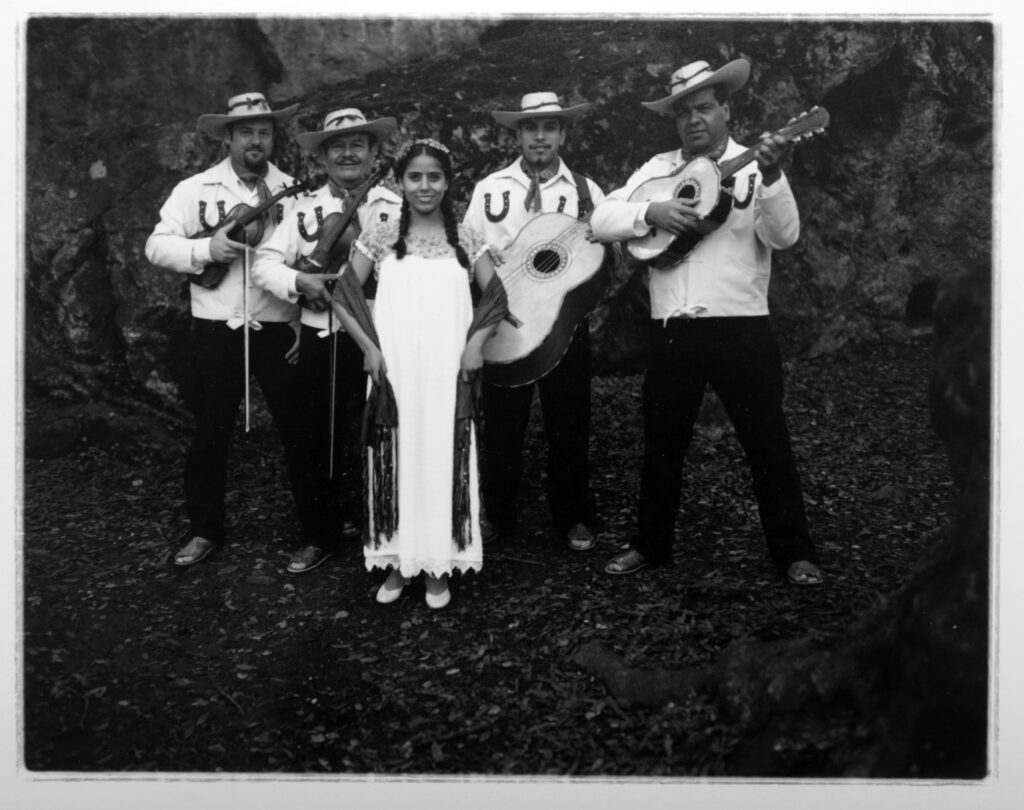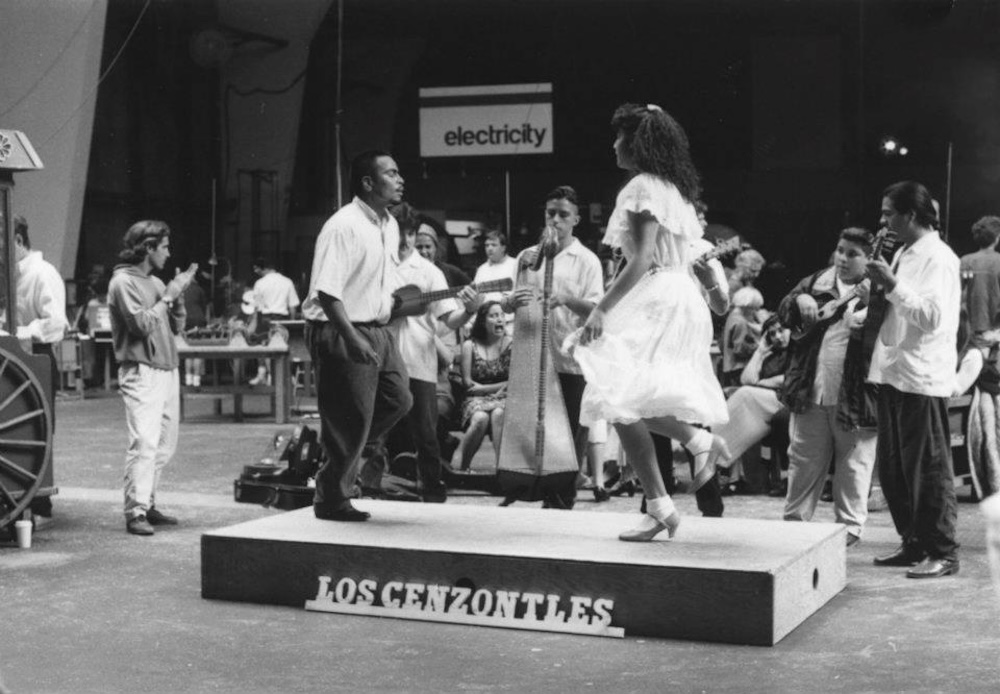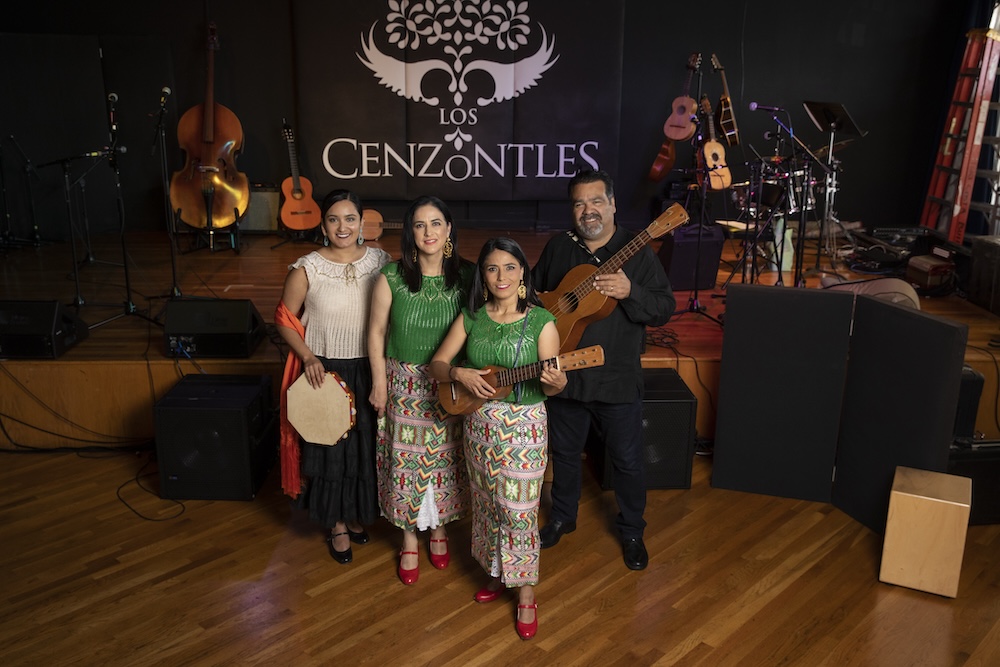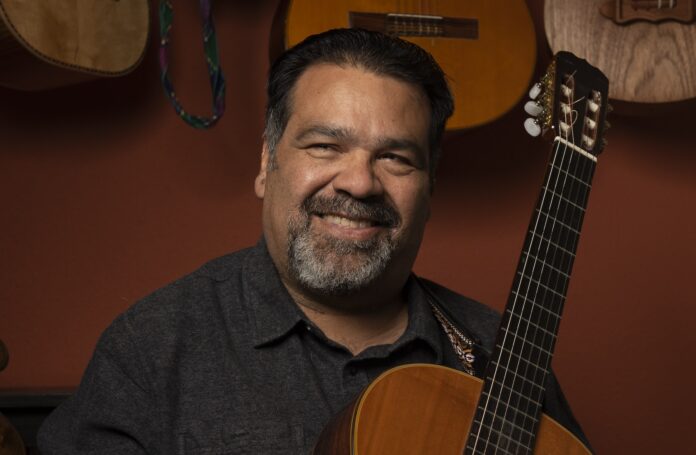Over the course of their youth and music non-profit’s 35-year existence, integrants of Los Cenzontles have learned the power of sharing their stories. That’s one reason why the San Pablo group has produced, alongside 20 films and 30 albums, over 100 music videos that can be found on a highly bingeable YouTube channel. The clips are stirring testaments to the musical alchemy that the organization conjures through teaching Bay Area youth the rhythms of traditional Mexican song and dance. But one video from 2014 managed to rile certain viewers.
In his memoir Bird of Four Hundred Voices: A Mexican American Memoir of Music and Belonging (Heyday Books, $28), Los Cenzontles founder Eugene Rodriguez speaks of this actually-quite-charming, minute-and-a-half medley of interviews with West Marin Elementary School students in lapel mics. In it, they are posed the question, “Are you Mexican or American?”
Responses vary. The climax belongs to the young gent who answers that he’s Mexican, “Because I eat a lot of beans,” though many of the kids say that they are both and none, that they are exclusively “American.” Rodriguez writes of the vitriol that this innocent clip conjured, concluding that the children’s refusal to erase their cultural heritage constituted a violation of “America’s myths of purity” (for certain hair-trigger internet denizens with too much time on their hands.)
Indeed, if there is one thing that Rodriguez will not tolerate in the pages of Bird of Four Hundred Voices, it is any attempt to box in Mexican Americans. A third-generation kid from Glendale (a sundown town until the 1960s, he reminds), the musician and educator located a key to resilience early on in Mexican music. Inspired by the days-long fandangos of Veracruz, community-wide celebrations guided by multi-generational artists, he immersed himself in their practice and lore, undaunted by the purists’ red flag that he had grown up in Alta California, speaking English.

It was in part this passion—set to the beat of the mellifluous tones of Weird Al Yankovic’s “Dare to be Stupid,” he writes—that led him to create a community institution, despite his relative greenness in the world of bureaucracy, eventually assisted by passionate staff who largely got their start as pupils themselves. Decades of largely-low-income students and their families became part of the Los Cenzontles community, from its movement classes frequented by five year olds to its eye-opening trips with advanced students to Mexican auditory meccas. The non-profit’s impact can be now be felt far beyond its official programming, from local “garage bandas” (playing the often-disparaged Mexican genre of música corriente) that have sprung up, to the Bay Area’s exaltation of Tierra Caliente arpa grande and Xichú, Guanajuato huapango traditions. Eventually, Rodriguez would pen a song called “Free To Be Me,” whose lyrics track such refusal to be pinned down: “No matter if they’re strangers or familia/Don’t let them put you in a box.”
Happily, there will be several chances to gather in honor of his highly readable recounting of this process. On August 10, Bird of Four Hundred Voices‘ release party will be held at Los Cenzontles Academy, followed by presentations on August 11 at the San Jose Jazz Summer Fest and August 23 at City Lights Bookstore (plus August 28 at Skylight Books with Gustavo Arellano, if you find yourself in Los Angeles.)
In an interview with 48hills, Rodriguez says he started writing the book as a practical guide for potential non-profit or program directors. But his literary agent saw something different. The finished product is the life story of Rodriguez, and of his dream that is all the time coming true.
Bird of Four Hundred Voices (its title a reference to the mockingbird from which Los Cenzontles takes its name, and who, Rodriguez writes, “listens to the sounds around it and incorporates them into its own voice—something humans also do innately when we engage with each other”) will still inspire, caution and inform those who would brave the paperwork and donor visits required of cultural administrators working for communities of color. But an even larger pool of readers will no doubt take strength from its pages.
“Bigots who understand the power of culture use it as a weapon for darkness, so we must use culture to assert a vision of light,” pens Rodriguez. This book is a celebration of community, and a call to protect it at all costs.

48HILLS What convinced you that it was time to pen your memoir?
EUGENE RODRIGUEZ This might be a long and uninteresting story, but it is true. At first I was writing a how-to book for people who were trying to build a program or organization based on their passion project. Then I sent it to a literary agent of a friend and she insisted that it become a memoir.
48HILLS Who is the audience that you envisioned for this book while writing it?
EUGENE RODRIGUEZ At first when it was a how-to book, I was writing it for people who wanted to realize their vision for the world. Then when it became a memoir, I really tried to write it for anyone who might be interested. At this point I hope that older Mexican American people might see themselves in my telling, and young people might find some encouragement to be themselves in this world.
48HILLS What made San Pablo the perfect home for Los Cenzontles?
EUGENE RODRIGUEZ Moving to San Pablo was a happenstance. At that time it was good because it is a small city, much smaller and less politically divisive than Richmond [where the organization was founded in 1989 before relocating to its current location, five years later.] But I have always thought that our project could have happened in any working-class Mexican American neighborhood—and there are many. But happily, we landed here.
48HILLS Your descriptions of both the challenges of running a non-profit and the teaching philosophy of Los Cenzontles will be fascinating to others who are taking on the challenge of promoting culture in oppressed communities. As a preview for readers who haven’t checked out Bird of Four Hundred Voices, can you describe the academy’s pedagogic style?
EUGENE RODRIGUEZ Our pedagogy is a hybrid, building off traditional modes of teaching within families (which take place over years) and altering them for our fast-paced urban lifestyle. We emphasize listening and communication through music, learning within a social structure, and not overemphasizing the performative aspect of the arts, rather focusing on expression—and being oneself. We do not insist on notation reading or music theory as a prerequisite. And our repertory is traditional music and dance, which I consider cultural stemcells for any other genre a student might wish to explore. Linda Ronstadt likened our approach to the slow food movement. [Journalists’ note: The book—and the Los Cenzontles story—is full of wildly famous allies, from Ronstadt to Taj Mahal, Ry Cooder, and Jackson Browne, as well as masters like one-time West Coast zydeco capital Richmond’s accordionist Andre Thierry and Gilberto Gutiérrez Silva, director of Grupo Mono Blanco.]

48HILLS Who are your inspirations when it comes to teaching?
EUGENE RODRIGUEZ My inspirations are the many folk artists who I have had the pleasure of working with. In a sense, they don’t “teach.” They played while I watched and listened—and they eventually invited me in to play with them. I feel that teaching music, and many other things in life, is really about putting students on the right track to discover the subject for themselves. This is especially important in this age of AI, when it is so easy to simply copy and paste information.
48HILLS In the book you write, “I see politics as a function of culture, not the other way around.” In this chaotic time, is there a particular cultural work—a specific artist, album, genre, song, perhaps—that you are turning to for hope and/or inspiration for braving 2024’s political storm?
EUGENE RODRIGUEZ I love the great composers who can tell a story of life in a concise, yet rich manner, such as John Prine and Jose Alfredo Jimenez.
BIRD OF FOUR HUNDRED VOICES RELEASE PARTY August 10, free. Los Cenzontles Academy, San Pablo. RSVP and more info here.




